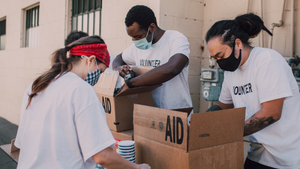Buffalo, N.Y.’s 48 hours to navigate a mission-critical transition to remote work
February 22, 2021

In Buffalo, N.Y., 311 is a vital lifeline for the city, providing an always-on call resource for the city’s 250,000 residents to reach city government. When the COVID-19 pandemic prompted a stay-at-home order, city officials knew a surge of calls was coming, and they needed to act fast to keep their front-line communications channel open. The Division of Citizen Services – a critical link between City Hall and Buffalo residents – had 48 hours to reconfigure the 311 Call & Resolution Center for remote work.
311 call and resolution center
While an online portal and app to log requests for city residents exists, the 311 Call & Resolution Center remains the primary route of communication for Buffalo residents to voice their concerns to City Hall – a necessary channel, especially amidst a pandemic. The center averaged 600 calls a day in normal times, about routine city services such as waste collection and streetlight and pothole repairs. When the pandemic hit calls increased to approximately 5,000 to 6,000 a day, as residents sought information about COVID-19 testing and unemployment benefits, among other issues created by the pandemic.
On a Friday in March, agents at the 311 Call & Resolution Center, like the majority of city employees, were instructed to begin working from home on the following Monday. But the city didn’t have infrastructure that would enable remote call-center operations, and employees weren’t accustomed to working from home. A solution was critically needed to maintain call center operations remotely – to answer calls from concerned residents and have secure access to city information and the latest guidance. And given the nature of the center operations, all of this needed to take place over the course of one weekend.
Enter Cisco and the University of Buffalo
As the city’s IT team explored its options for remote call-center operations, Cisco – a long-term advisor– suggested the team speak with the University of Buffalo. The University of Buffalo had been using Cisco Expressway for some time to deliver highly secure access to collaboration workloads. It also uses Cisco Unified Communications Manager (UCM) to provide reliable, secure, and scalable, call control and session management.
“Over the years working with Cisco, we’ve developed procedures and standardized solutions that help us in our day-to-day work. We’d proven to ourselves we can scale up and deploy quickly to our faculty and staff as needed. Could we do the same for the city? You bet,” said Adam Pawlowski, IT Communications Systems Engineer at the University of Buffalo.
Over the weekend, city, university and Cisco staff worked together to connect the university into Cisco Webex Contact Center for the City of Buffalo and provide the link between the phones for remote workers and the call center application City Hall runs within Webex. From there, the 311 number was connected to the university system, allowing a seamless transition of operations to remote work. New phones, headsets, and training information was delivered to call center agents’ homes on Sunday.
48 hours later
Come Monday morning at 8:30 am, calls from Buffalo residents were answered by call center agents, who quickly adapted to the new system. Vital city communications continued unabated. Navigating a mission-critical situation such as this one during a peak of the COVID-19 pandemic and new remote work territory was no easy feat, and countless hours were spent working towards this accomplishment.
“We were able to bring in new users, quickly and securely, using tried and true, repeatable methods and procedures,” Pawlowski said. “With our experience on campus being nimble and constantly adding new users, we knew we could respond to this challenge and it was going to work.”
Moving forward, we feel confident that Buffalo, New York – the City of Good Neighbors – can use technology to more quickly and more reliably answer the call and respond to our citizens in a pandemic and beyond.
Oswaldo Mestre Jr. is the Chief Service Officer and Director of the Citizen Services for the City of Buffalo and serves as the City’s ombudsman. Appointed by Mayor Byron W. Brown in January 2006, Director Mestre leads the administration of the Mayor’s Call & Resolution Center and various special programs designed to address the needs of Buffalo’s neighborhoods, such as the implementation of the city’s new 311 Call & Resolution center recently awarded and designated as a “Citizen–Engaged Community” by the Public Technology Institute, Inc. for 2010-2012 and 2012-2014.







